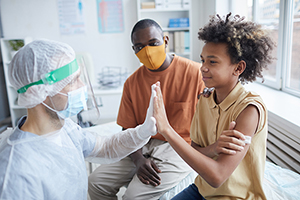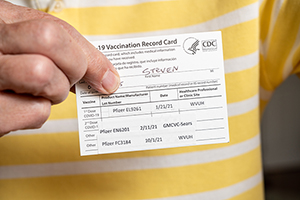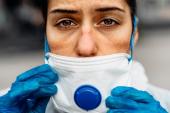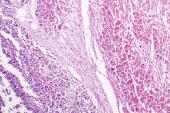COVID-19: TCTMD’s Dispatch for November Week 5
We’re curating a list of COVID-19 research and other useful content, and updating it regularly.

Since March 2020, TCTMD reporter Todd Neale has been writing up breaking news and peer-reviewed research related to COVID-19 every weekday. In July 2021, we transitioned to Mondays, Wednesdays, and Fridays. If you have something to share, tell us. All of our COVID-19 coverage can be found on our COVID-19 Hub.
December 3, 2021
Don’t panic when it comes to Omicron, Soumya Swaminathan, MBBS, MD, chief scientist of the World Health Organization (WHO), said on Friday (Reuters). “While the emergence of the new variant was unwelcome, she said the world was much better prepared given the development of vaccines since the start of the COVID-19 pandemic.”
 One of the first Omicron cases detected in Israel was a cardiologist—who had received three doses of the vaccine from Pfizer/BioNTech—returning from PCR London Valves, TCTMD’s Michael O’Riordan reports. “By definition, it would be described as mild disease, even though I had a fever and I was in bed for 48 hours,” Elad Maor, MD, PhD, said. “I’m relatively young—I’m 45—but I’m not overweight, I don’t smoke, and I exercise regularly. I don’t have any comorbidities. I’m healthy and fully vaccinated. You’d expect a walk in the park. Well, it’s not. It’s definitely not.”
One of the first Omicron cases detected in Israel was a cardiologist—who had received three doses of the vaccine from Pfizer/BioNTech—returning from PCR London Valves, TCTMD’s Michael O’Riordan reports. “By definition, it would be described as mild disease, even though I had a fever and I was in bed for 48 hours,” Elad Maor, MD, PhD, said. “I’m relatively young—I’m 45—but I’m not overweight, I don’t smoke, and I exercise regularly. I don’t have any comorbidities. I’m healthy and fully vaccinated. You’d expect a walk in the park. Well, it’s not. It’s definitely not.”
A number of US cases of Omicron have been detected in the days since the first was found in a California resident who had traveled to South Africa (STAT). Since then, more have cropped up in that state in addition to Colorado, Hawaii, Minnesota, and New York (New York Times), with some involving no history of travel, suggesting community spread.
While Omicron garners everybody’s attention, the world shouldn’t forget that the Delta variant remains the driving force behind infections in various regions (CIDRAP News). COVID-19 prevalence in England is rising due to Delta (Reuters), and US hot spots—in the Midwest and New England, for example—are dealing with surges related to the variant (Associated Press).
Germany, which is going through yet another wave of infections, has placed restrictions on unvaccinated people, with outgoing Chancellor Angela Merkel calling the curbs an act of “national solidarity,” BBC News reports. “Only those who have been vaccinated or recently recovered from COVID will be allowed in restaurants, cinemas, leisure facilities, and many shops,” the story notes.
Results of the COV-BOOST study have been published in the Lancet, showing that any of the seven COVID-19 vaccines evaluated safely boosted immune responses when given as a third dose after two doses of the vaccine from Oxford/AstraZeneca, with all but one of the shots proving beneficial after initial vaccination with the Pfizer/BioNTech vaccine. The boosts were largest with either of the mRNA vaccines from Pfizer/BioNTech or Moderna. “It’s really encouraging that a wide range of vaccines, using different technologies, show benefits as a third dose to either AstraZeneca or Pfizer/BioNTech,” one of the researchers said in a press release. “That gives confidence and flexibility in developing booster programs here in the UK and globally, with other factors like supply chain and logistics also in play.” Reuters has more.
When the mRNA vaccines from Moderna and Pfizer/BioNTech go toe to toe, Moderna appears to have an edge, according to a real-world study of US military veterans published in the New England Journal of Medicine. Overall, the 24-week risk of COVID-19 outcomes was low in both groups, with lower risks among those who had received the Moderna shots. As noted in an accompanying editorial, however, the differences may not be meaningful: “The lesson we take away is not about differences—it’s about similarities. We are lucky to have such good options. Vaccination with any vaccine is far better than remaining unprotected. The message is that the best vaccine is the one that’s available.”
 The safety committee of the European Medicines Agency (EMA) released an update of its assessment of the risks of myocarditis and pericarditis after receipt of one of the mRNA vaccines based on two large epidemiological studies. The new data confirm that the events are “very rare,” occurring in up to one in 10,000 vaccinated people, with the highest risks in younger males. The agency “confirms that the benefits of all authorized COVID-19 vaccines continue to outweigh their risks.”
The safety committee of the European Medicines Agency (EMA) released an update of its assessment of the risks of myocarditis and pericarditis after receipt of one of the mRNA vaccines based on two large epidemiological studies. The new data confirm that the events are “very rare,” occurring in up to one in 10,000 vaccinated people, with the highest risks in younger males. The agency “confirms that the benefits of all authorized COVID-19 vaccines continue to outweigh their risks.”
Preclinical data indicate that sotrovimab, an investigational monoclonal antibody from GlaxoSmithKline and Vir Biotechnology, maintains activity against key mutations characteristic of the Omicron variant, the companies announced Thursday. Additional testing is ongoing. Also Thursday, the UK drug regulator approved the therapy for treatment of patients with mild-to-moderate COVID-19 who are at high risk for progressing to severe disease (Reuters).
Another investigational monoclonal antibody, lenzilumab (Humanigen/Catalent), improves survival without invasive mechanical ventilation to day 28 in patients hospitalized with COVID-19 compared with placebo (84% vs 78%), according to results of the phase III LIVE-AIR trial published in the Lancet Respiratory Medicine. “The added value of lenzilumab beyond other immunomodulators used to treat COVID-19 alongside steroids remains unknown,” the authors write.
 Patients who have unexplained dyspnea months after recovering from COVID-19 often have objective signs of breathing problems on cardiopulmonary exercise testing (CPET) and meet criteria for myalgic encephalomyelitis/chronic fatigue syndrome (ME/CFS), a small, single-center study published in JACC: Heart Failure suggests. “In patients who have persistent dyspnea and there’s no clear etiology, they all should have a cardiopulmonary exercise test,” the lead author told TCTMD.
Patients who have unexplained dyspnea months after recovering from COVID-19 often have objective signs of breathing problems on cardiopulmonary exercise testing (CPET) and meet criteria for myalgic encephalomyelitis/chronic fatigue syndrome (ME/CFS), a small, single-center study published in JACC: Heart Failure suggests. “In patients who have persistent dyspnea and there’s no clear etiology, they all should have a cardiopulmonary exercise test,” the lead author told TCTMD.
December 1, 2021
The world continues to anxiously await more information on the Omicron variant of SARS-CoV-2. As the Associated Press reports, Omicron “kept a jittery world off-kilter Wednesday as Japan further tightened travel restrictions, infections linked to the new version of the coronavirus popped up in more places, and new evidence made clear the mutant strain was circulating weeks earlier than thought. Much is still unknown about the new variant, including how contagious it is and whether it can evade vaccines, and the European Union chief acknowledged that waiting for scientists to tell the world more felt like ‘an eternity.’ Meanwhile, many nations in Europe are still dealing with a surge in infections and hospitalizations from their old foe, the Delta variant.”
 As for the earlier circulation of Omicron, health officials in the Netherlands said Tuesday that they detected the variant in two samples collected before travel restrictions were put in place, CIDRAP News reports. In updated guidance, the World Health Organization (WHO) urged countries to use evidence- and risk-based approaches when implementing travel curbs and advised against “blanket travel bans” because they “will not prevent the international spread, and they place a heavy burden on lives and livelihoods. In addition, they can adversely impact global health efforts during a pandemic by disincentivizing countries to report and share epidemiological and sequencing data.”
As for the earlier circulation of Omicron, health officials in the Netherlands said Tuesday that they detected the variant in two samples collected before travel restrictions were put in place, CIDRAP News reports. In updated guidance, the World Health Organization (WHO) urged countries to use evidence- and risk-based approaches when implementing travel curbs and advised against “blanket travel bans” because they “will not prevent the international spread, and they place a heavy burden on lives and livelihoods. In addition, they can adversely impact global health efforts during a pandemic by disincentivizing countries to report and share epidemiological and sequencing data.”
On Tuesday, a US Food and Drug Administration (FDA) advisory committee voted by a narrow margin (13-10) that the benefits of molnupiravir—the investigational oral COVID-19 pill developed by Merck and Ridgeback Therapeutics—outweigh the risks, which include potential birth defects if used during pregnancy (Associated Press). “I see this as an incredibly difficult decision with many more questions than answers,” the panel chair said. Meanwhile, a Merck official said molnupiravir should have similar effects against any SARS-CoV-2 variant, although the comments were not specifically addressing Omicron, Reuters reports.
An attendee of PCR London Valves 2021, who had received three doses of the COVID-19 vaccine from Pfizer/BioNTech, tested positive for infection with the Omicron variant upon returning to Israel. The organizers of the conference placed a notice on their website stating that UK health officials would be handling contact tracing. Keep an eye out for a full story from TCTMD.
Janet Woodcock, MD, acting commissioner of the FDA, released a statement Tuesday saying that the agency is actively investigating the impact of Omicron on diagnostics, therapeutics, and vaccines, with results regarding the efficacy of vaccines expected within a few weeks. “Getting vaccinated or receiving a booster with one of the currently available vaccines is the best thing that you can do right now (in addition to standard precautions like wearing a mask) to help protect yourself, your family, and friends,” she said.
STAT’s reporters have a couple of stories out that delve into potential reasons for cautious optimism when it comes to Omicron, which has the world spooked. “While the concerns are understandable, experts in immunology say people need to remember a critical fact: 2 years and 8 billion vaccine doses into the pandemic, many immune systems are no longer blank slates when it comes to SARS-CoV-2,” which could help provide some protection against the variant, Helen Branswell notes. And Andrew Joseph points out that there are some early signs that Omicron may cause milder symptoms than other variants. “But actually understanding Omicron’s severity is an open question, experts caution—one that requires more patient data and more time to answer,” he writes.
 US President Joe Biden’s national vaccine mandate for healthcare workers, due to start next week, has been blocked by a federal judge, expanding orders from other courts, the New York Times reports. “There is no question that mandating a vaccine to 10.3 million healthcare workers is something that should be done by Congress, not a government agency,” the judge wrote. “It is not clear that even an act of Congress mandating a vaccine would be constitutional.”
US President Joe Biden’s national vaccine mandate for healthcare workers, due to start next week, has been blocked by a federal judge, expanding orders from other courts, the New York Times reports. “There is no question that mandating a vaccine to 10.3 million healthcare workers is something that should be done by Congress, not a government agency,” the judge wrote. “It is not clear that even an act of Congress mandating a vaccine would be constitutional.”
There is no short-term risk of severe cardiovascular events in older adults who are vaccinated against COVID-19 with the Pfizer/BioNTech mRNA vaccine, according to the results of new observational study from France published in JAMA. The findings “should close the book on the concerns about these three cardiovascular events studied here—myocardial infarction, stroke, pulmonary embolism,” the lead author told TCTMD’s Michael O’Riordan.
Another study presented as an ePoster at the virtual American Heart Association (AHA) Scientific Sessions suggesting an increased risk of ACS following mRNA vaccination gained traction on social media, but questions have been raised about the legitimacy of the findings. Circulation published an Expression of Concern about the abstract, pointing to multiple potential problems: “Specifically, there are several typographical errors, there is no data in the abstract regarding myocardial T-cell infiltration, there are no statistical analyses for significance provided, and the author is not clear that only anecdotal data was used.” An AHA spokesperson told TCTMD that the researcher, who has been in communication with the group, has been given a deadline of Friday evening to provide a correction.
Regeneron said Tuesday that prior results of lab testing “regarding the individual mutations present in the Omicron variant indicate that there may be reduced neutralization activity of both vaccine-induced and monoclonal antibody-conveyed immunity,” including that from the company’s REGEN-COV antibody therapy that combines casirivimab and imdevimab. Additional testing is ongoing, the company said. The New York Times has more.
 Receipt of a third dose of the vaccine from Pfizer/BioNTech is associated with lower odds of testing positive for SARS-CoV-2 compared with receipt of two doses, according to an Israeli study in JAMA Internal Medicine. Positive results were seen in 6.6% of people who had received two doses and 1.8% of those who had received a booster, translating to a relative 86% lower likelihood of testing positive 28 to 65 days after the third dose.
Receipt of a third dose of the vaccine from Pfizer/BioNTech is associated with lower odds of testing positive for SARS-CoV-2 compared with receipt of two doses, according to an Israeli study in JAMA Internal Medicine. Positive results were seen in 6.6% of people who had received two doses and 1.8% of those who had received a booster, translating to a relative 86% lower likelihood of testing positive 28 to 65 days after the third dose.
November 29, 2021
Much remains unknown about the Omicron variant of SARS-CoV-2 first detected in Botswana, designated by the World Health Organization (WHO) as a variant of concern late last week, but the scientific community is scrambling to fill in the knowledge gaps. In an update posted Sunday, the WHO notes that we don’t yet know whether the variant is more or less transmissible, whether it causes more-severe disease, and how effective current vaccines are against it. Nonetheless, in a technical report, the agency said “the overall global risk related to the new variant of concern Omicron is assessed as very high.” People should continue taking steps to reduce spread of the virus, which include physical distancing, mask wearing, avoiding poorly ventilated or crowded spaces, and getting vaccinated.
 A news story from ScienceInsider delves into why it’ll be weeks before researchers have any definitive data on how dangerous Omicron will be. STAT’s Andrew Joseph also goes into why patience will be needed over the coming weeks and why this variant is different from previous ones. “As they race to launch more rigorous studies, scientists for now are trying to glean insights from limited epidemiological evidence in South Africa and from the list of mutations the variant has acquired, some of which are associated with an increased ability to spread or to get around immune protection,” he writes. “The variant is also notable for its sheer number of mutations: 32 alone in its spike protein, which is what the vaccines teach our immune systems to target. Other variants just had a handful of mutations in spike.”
A news story from ScienceInsider delves into why it’ll be weeks before researchers have any definitive data on how dangerous Omicron will be. STAT’s Andrew Joseph also goes into why patience will be needed over the coming weeks and why this variant is different from previous ones. “As they race to launch more rigorous studies, scientists for now are trying to glean insights from limited epidemiological evidence in South Africa and from the list of mutations the variant has acquired, some of which are associated with an increased ability to spread or to get around immune protection,” he writes. “The variant is also notable for its sheer number of mutations: 32 alone in its spike protein, which is what the vaccines teach our immune systems to target. Other variants just had a handful of mutations in spike.”
Perhaps some cause for cautious optimism: early cases of infection with the Omicron variant seen by one South African doctor were accompanied by “very mild” symptoms, Reuters reports. “Most of them are seeing very, very mild symptoms and none of them so far have admitted patients to surgeries. We have been able to treat these patients conservatively at home,” the doctor said.
Despite the uncertainties, Omicron is already having a big impact around the world (Reuters), with infections from the variant being reported in additional countries seemingly by the hour (Associated Press) and travel restrictions rolling out. Japan, Israel, and Morocco have banned all foreign travelers, Australia has delayed opening its borders for 2 weeks, and South Korea has delayed plans to loosen restrictions (New York Times). Other countries, including the United States, the United Kingdom, and Canada, as well as the European Union, have moved to restrict travelers from southern Africa.
Still, Anthony Fauci, MD, Director of the US National Institute of Allergy and Infectious Diseases and President Biden’s chief medical adviser for COVID-19, said over the weekend that Omicron’s arrival in the US is inevitable (Politico), as neighboring Canada reported its first two known cases on Sunday. The governor of New York declared a state of emergency “aimed at increasing hospital capacity and addressing medical staffing shortages” in preparation for the new variant, HuffPost reports. US governors are largely urging caution until more is known (New York Times).
 Novavax said Friday it’s developing a vaccine targeting Omicron (Reuters), which would be ready for testing and manufacturing in the next few weeks. Another company, Inovio Pharmaceuticals, is doing the same, as other vaccine makers test their existing shots against the variant.
Novavax said Friday it’s developing a vaccine targeting Omicron (Reuters), which would be ready for testing and manufacturing in the next few weeks. Another company, Inovio Pharmaceuticals, is doing the same, as other vaccine makers test their existing shots against the variant.
A US Food and Drug Administration (FDA) advisory committee will meet Tuesday to discuss whether the oral COVID-19 pill from Merck and Ridgeback Biotherapeutics—molnupiravir—should receive an emergency use authorization for the treatment of mild-to-moderate COVID-19 in adults who are at risk for progressing to severe disease and/or hospitalization. In briefing documents posted ahead of the meeting, agency scientists “did not take a position on whether the drug should be authorized, though they found that the clinical trial data did not show any major safety concerns and that the drug was effective in preventing severe disease,” the New York Times reports. The reviewers are still looking at the company data released last week that indicated a lower efficacy estimate than initially reported weeks ago, which could impact the FDA’s assessment when the panel meets tomorrow.
Todd Neale is the Associate News Editor for TCTMD and a Senior Medical Journalist. He got his start in journalism at …
Read Full Bio





Comments